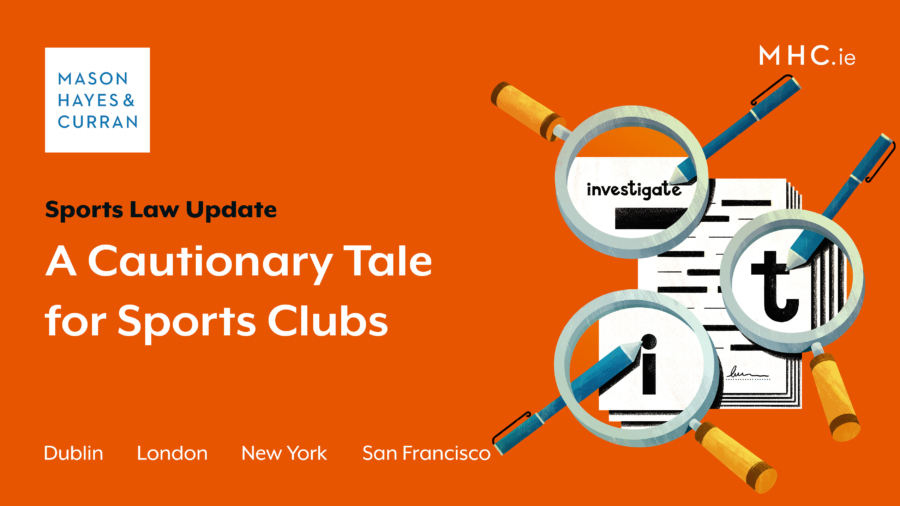A Cautionary Tale for Sports Clubs

A recent High Court case highlights the importance of sports clubs having accurate and up-to-date lists of paid-up members, together with written club rules. Our Sports Law team reviews the impact of this decision and provides some helpful tips for sporting organisations.
The majority of sports clubs in Ireland are unincorporated associations. This means that they cannot be sued by their own members even if a member sustains an injury due to the club’s alleged negligence.
In Glenn Doyle v Crumlin Boxing Club and Irish Amateur Boxing Association (IABA), the High Court had to consider this point and determine whether or not the plaintiff was a member of Crumlin Boxing Club at the time he was injured. The Court also needed to decide whether he was entitled to sue the club for compensation for his injuries.
Background
The plaintiff, Mr Doyle, suffered a fractured jaw, damaged teeth and had to be hospitalised after he was assaulted on a trip to Spain with Crumlin Boxing Club. At the time of the assault, Mr Doyle was a volunteer coach in the boxing club. He issued a claim in the High Court against both his club and the IABA seeking compensation for his injuries. The boxing club argued that Mr Doyle was not entitled to sue them as he was a member of the club at the time that he suffered his injuries.
Mr Doyle contended that he had not paid his membership subscription for several years and that his role as a volunteer coach did not necessarily make him a club member. The club’s position was that Mr Doyle was treated as a club member and that all coaches in the club were required to be members.
Despite the requirement from the IABA that boxing clubs must submit a list of their members and coaches each year, Mr Doyle was not included on the list of coaches or the list of members submitted to the IABA in 2017, the year the assault took place.
The High Court noted that the club had adopted a "lenient and flexible” attitude about the requirement to pay member subscriptions and had no written rules or club constitution in place.
Ultimately, the court accepted that Mr Doyle’s name was not included on the register of members, he had not paid a membership subscription and there was no documented club rule that coaches were required to be club members. On that basis, the Court determined that there was no evidence that membership status had been afforded to Mr Doyle and he was therefore entitled to proceed with his personal injuries claim against the club.
McGroarty v Cobh Golf Club
The importance of clarity about membership status was also highlighted in this case from 2021. Mr McGroarty sustained injuries to his hand while carrying out volunteering works at the Cobh Golf Club. He sued the golf club for compensation for his hand injuries.
The golf club had a membership rule in place that membership automatically terminated on 31 January each year if subscriptions were not paid in full by that date. While Mr McGroarty had made a contribution towards his membership subscription, it was not paid in full by the required date. Despite this, the club permitted him to play golf and take part in a number of club competitions.
The golf club argued that Mr McGroarty was not entitled to sue them as he had been treated by the club as an active member and had received the benefits of club membership, which included participating in club competitions.
The High Court, in considering the rules of the golf club, found that these rules represented a contract between the club and its members. It also found that it was clear from those rules that membership automatically terminated if payment had not been made in full by 31 January each year. The High Court determined that Mr McGroarty was not a member of the club at the time his accident occurred as his membership had not been paid in full by 31 January in the relevant year. He was therefore entitled to sue the club and, ultimately, he was awarded €100,000 in compensation for his injuries.
Conclusion
It is important that sports clubs review and understand their own club rules and adhere strictly to them. Accurate and up-to-date lists of members should be maintained and rules about the payment of member subscriptions should be enforced. Just because someone is considered to be and is treated as a club member, does not mean that they are a club member in the legal sense. Membership status is only conferred when the rules of membership are complied with. This includes the payment of membership subscriptions in full and on time and if required, the entry of members’ details in the register of members.
In the Crumlin Boxing Club case, the High Court commented that club rules do not need to be elaborate but they should be clear and they should be applied. Otherwise, clubs “lose control over their membership”. This can lead to a greater exposure to claims taken by players, coaches or volunteers whom the club believe are members but who may not have legal status as a club member.
For more information and expert advice, contact a member of our Sports Law team.
The content of this article is provided for information purposes only and does not constitute legal or other advice.
Share this:


